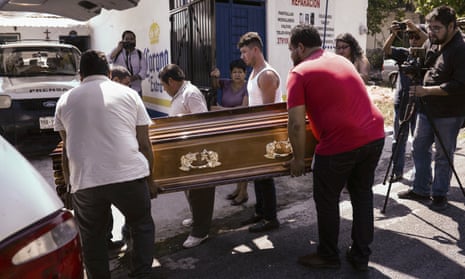Journalists in Mexico have said the new government is failing to protect them after three reporters were murdered in less than a week.
Jorge Ruiz Vázquez, a reporter with the Gráfico de Xalapa newspaper, was the latest victim, shot dead late on Friday night in Actopan, in Veracruz state. He was supposed to have received protection from state security forces but this was missing on the night of the killing.
Last year he had accused the mayor of corruption and his home was attacked. He was scheduled to testify before state authorities this month on threats the mayor had allegedly made against him.
Mexico has been a deadly place for journalists over the past 13 years as a crackdown on drug cartels and organised crime has worn on. Measures taken to try to protect the press have included appointing a special prosecutor to pursue crimes against journalists.
But the political will to protect journalists appears stubbornly absent, especially in states such as Veracruz, a long and sweaty sliver along the Gulf coast where politicians often act in cahoots with narcotics traffickers.
“There’s an impunity rate of 99% and no political will to clear up these crimes. There’s only rhetoric on [the issue] from the state government,” said Miguel Ángel Díaz, the publisher of Plumas Libres, a Veracruz news outlet.
Press freedom organisations caution against pinning the blame on organised crime as many of the threats made against journalists come from public officials uncomfortable with scrutiny and used to operating without oversight.
Carlos Bravo Regidor, a journalism professor in Mexico City, said: “Most of this aggression, most of these murders come from a murky grey zone where it’s not clear where organised crime ends and public authority begins. It’s the everyday reality in many parts of Mexico.
The National Human Rights Commission has reported 152 journalists’ death since 2000, and the misery has deepened in 2019 despite the change of government. The president, Andrés Manuel López Obrador, promised to calm the county and stop the killings of journalists but his relationship with the media has turned testy since he took office.
He has called publications critical of his administration “conservatives” and “fifís” (toffs), language now copied by politicians in the provinces where local journalists usually earn miserable wages, work without benefits and moonlight to make ends meet.
López Obrador’s supporters often use social media to besiege any reporters asking tough questions at his daily morning press conferences, and the president recently berated the newsweekly Proceso for not taking his side.
Javier Garza, a former director of the newspaper El Siglo de Torreón, said: “This government hasn’t put much attention on this problem so it continues growing. They’re giving a bigger budget to baseball than the mechanism for protecting journalists, if you want an indication of the interest.”
Mexico’s murder rate hit a record high in the first six months of 2019. Nine journalists have been killed for carrying out journalistic duties this year, according to press freedom organisations.
A reporter in Guerrero state who also served as a municipal official was shot and killed on Friday. Earlier last week a reporter who covered the police in the same state was found dead in the boot of a vehicle. There were signs he had been shot and tortured.
Last Wednesday El Monitor d Parral suspended its print edition after its offices were firebombed. And recently assailants ransacked the Cancún-area home of Lydia Cacho, a journalist who investigates human trafficking, child sex rings and the powerful men behind them. They stole documents related to her investigation and poisoned her two dogs.
